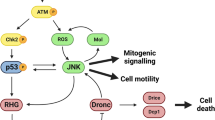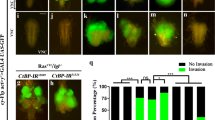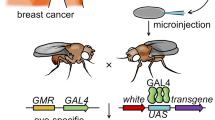Abstract
TUMOUR metastasis is the principal cause of death for cancer patients1. We have identified the nm23 gene, for which RNA levels are reduced in tumour cells of high metastatic potential2–5. In this report we identify the cytoplasmic and nuclear Nm23 protein, and show that it also is differentially expressed in metastatic tumour cells. We also find that the human Nm23 protein has sequence homology over the entire translated region with a recently described developmentally regulated protein in Drosophila, encoded by the abnormal wing discs (awd) 6–8 gene. Mutations in awd cause abnormal tissue morphology and necrosis and widespread aberrant differentiation in Drosophila6, analogous to changes in malignant progression. The metastatic state may therefore be determined by the loss of genes such as nm23/ awd which normally regulate development.
This is a preview of subscription content, access via your institution
Access options
Subscribe to this journal
Receive 51 print issues and online access
$199.00 per year
only $3.90 per issue
Buy this article
- Purchase on Springer Link
- Instant access to full article PDF
Prices may be subject to local taxes which are calculated during checkout
Similar content being viewed by others
References
Sugarbaker, E. V. Cancer Biol. Rev. 2, 235–278 (1981).
Steeg, P. S. et al. J. natn. Cancer Inst. 80, 200–204 (1988).
Steeg, P. S., Bevilacqua, G., Pozzatti, R., Liotta, L. A. & Sobel, M. E. Cancer Res. 48, 6550–6554 (1988).
Steeg, P. S. et al. in Cancer Metastasis (eds Schirrmacher, V. & Schwartz-Albiez, R.) 48–52 (Springer, Heidelberg, 1989).
Bevilacqua, G., Sobel, M. E., Liotta, L. A. & Steeg, P. S. Cancer Res. 49, 5185–5190 (1989).
Dearolf, C. R. Hersperger, E. & Shearn, A. Devl Biol 129, 159–168 (1988).
Dearolf, C. R., Tripoulas, N., Biggs, J. & Shearn, A. Devl Biol. 129, 169–178 (1988).
Biggs, J., Tripoulas, N., Hersperger, E., Dearolf, C. & Shearn, A. Genes Dev. 2, 1333–1343 (1988).
Soule, H. D., Vazquez, J., Long, A., Albert, S. & Brennan, M. J. natn. Cancer Inst. 51, 1409–1413 (1973).
Fidler, I. J. & Hart, I. R. Science 217, 998–1003 (1982).
Hutter, R. V. P. Cancer 46, 961–976 (1980).
Kozak, M. Cell 44, 283–292 (1986).
Höyhtä, M. et al. FEBS Lett 233, 109–113 (1988).
Basic Methods in Molecular Biology. (eds Davis, L. G., Dibner, M. D. & Battey, J. F.) 48–49 (Elsevier, New York, 1986).
Pearson, W. R. & Lipman, D. J. Proc. natn. Acad. Sci. U.S.A. 85, 2444–2448 (1988).
Author information
Authors and Affiliations
Rights and permissions
About this article
Cite this article
Rosengard, A., Krutzsch, H., Shearn, A. et al. Reduced Nm23/Awd protein in tumour metastasis and aberrant Drosophila development. Nature 342, 177–180 (1989). https://doi.org/10.1038/342177a0
Received:
Accepted:
Issue Date:
DOI: https://doi.org/10.1038/342177a0
This article is cited by
-
Hydrogen peroxide initiates oxidative stress and proteomic alterations in meningothelial cells
Scientific Reports (2022)
-
The Function of NM23-H1/NME1 and Its Homologs in Major Processes Linked to Metastasis
Pathology & Oncology Research (2020)
-
Mutations at the dimer interface and surface residues of Nm23-H1 metastasis suppressor affect its expression and function
Molecular and Cellular Biochemistry (2020)
-
The dosage-dependent effect exerted by the NM23-H1/H2 homolog NDK-1 on distal tip cell migration in C. elegans
Laboratory Investigation (2018)
-
A survey of metastasis suppressors in Metazoa
Laboratory Investigation (2018)
Comments
By submitting a comment you agree to abide by our Terms and Community Guidelines. If you find something abusive or that does not comply with our terms or guidelines please flag it as inappropriate.



